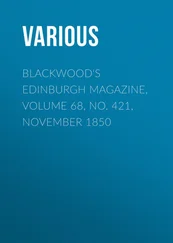Various - Blackwood's Edinburgh Magazine, Vol. 66, No 409, November 1849
Здесь есть возможность читать онлайн «Various - Blackwood's Edinburgh Magazine, Vol. 66, No 409, November 1849» — ознакомительный отрывок электронной книги совершенно бесплатно, а после прочтения отрывка купить полную версию. В некоторых случаях можно слушать аудио, скачать через торрент в формате fb2 и присутствует краткое содержание. Издательство: Иностранный паблик, Жанр: periodic, foreign_edu, Путешествия и география, на английском языке. Описание произведения, (предисловие) а так же отзывы посетителей доступны на портале библиотеки ЛибКат.
- Название:Blackwood's Edinburgh Magazine, Vol. 66, No 409, November 1849
- Автор:
- Издательство:Иностранный паблик
- Жанр:
- Год:неизвестен
- ISBN:нет данных
- Рейтинг книги:3 / 5. Голосов: 1
-
Избранное:Добавить в избранное
- Отзывы:
-
Ваша оценка:
- 60
- 1
- 2
- 3
- 4
- 5
Blackwood's Edinburgh Magazine, Vol. 66, No 409, November 1849: краткое содержание, описание и аннотация
Предлагаем к чтению аннотацию, описание, краткое содержание или предисловие (зависит от того, что написал сам автор книги «Blackwood's Edinburgh Magazine, Vol. 66, No 409, November 1849»). Если вы не нашли необходимую информацию о книге — напишите в комментариях, мы постараемся отыскать её.
Blackwood's Edinburgh Magazine, Vol. 66, No 409, November 1849 — читать онлайн ознакомительный отрывок
Ниже представлен текст книги, разбитый по страницам. Система сохранения места последней прочитанной страницы, позволяет с удобством читать онлайн бесплатно книгу «Blackwood's Edinburgh Magazine, Vol. 66, No 409, November 1849», без необходимости каждый раз заново искать на чём Вы остановились. Поставьте закладку, и сможете в любой момент перейти на страницу, на которой закончили чтение.
Интервал:
Закладка:
No length of solitary confinement, or scarce any amount of moral or religious instruction, can awaken in them either the slightest repentance for their crimes, or the least power of self-control when temptation is again thrown in their way. They regard the period of imprisonment as a blank in their lives – a time of woful monotony and total deprivation of enjoyment, which only renders it the more imperative on them, the moment it is terminated, to begin anew with fresh zest their old enjoyments. Their first object is to make up for months of compulsory sobriety by days of voluntary intoxication. At the close of a short period of hideous saturnalia , they are generally involved in some fresh housebreaking or robbery, to pay for their long train of indulgence; and soon find themselves again immured in their old quarters, only the more determined to run through the same course of forced regularity and willing indulgence. They are often able to feign reformation, so as to impose on their jailors, and obtain liberation on pretended amendment of character. But it is rarely if ever that they are really reclaimed; and hence the perpetual recurrences of the same characters in the criminal courts; till the magistrates, tired of imprisoning them, send them to the assizes or quarter-sessions for transportation. Even then, however, their career is often far from being terminated in this country. The keepers of the public penitentiaries become tired of keeping them. When they cannot send them abroad, their cells are soon crowded; and they take advantage of a feigned amendment to open the prison doors and let them go. They are soon found again in their old haunts, and at their old practices. At the spring circuit held at Glasgow in April 1848, when the effects of the recent imprisonment mania were visible, – out of 117 ordinary criminals indicted, no less than twenty-two had been sentenced to transportation at Glasgow, for periods not less than seven years, within the preceding two years ; and the previous conviction and sentence of transportation was charged as an aggravation of their new offence against each in the indictment.
The next reason which renders imprisonment, in an old society and amidst a redundant population, utterly inefficacious as a means of reforming criminals is, that, even if they do imbibe better ideas and principles during their confinement, they find it impossible on their liberation to get into any honest employment, or gain admission into any well-doing circle, where they may put their newly-acquired principles into practice. If, indeed, there existed a government or parochial institution, into which they might be received on leaving prison, and by which they might be marched straightway to the nearest seaport, and there embarked for Canada or Australia, a great step would be made towards giving them the means of durable reformation. But as there is none such in existence, and as they scarcely ever are possessed of money enough, on leaving prison, to carry them across the Atlantic, they are of necessity obliged to remain in their own country – and that, to persons in their situation, is certain ruin. In new colonies, or thinly-peopled countries, such as Australia or Siberia, convicts, from the scarcity of labour, may in general be able to find employment; and from the absence of temptation, and the severance of the links which bound them to their old associates, they are often there found to do well. But nothing of that sort can be expected in an old and thickly-peopled country, where the competition for employment is universal, and masters, having the choice of honest servants of untainted character, cannot be expected to take persons who have been convicted of crimes, and exposed to the pollutions of a jail.
Practically speaking, it is impossible for persons who have been in jail to get into any honest or steady employment in their own country; and if they do by chance, or by the ignorance of their employers of their previous history, get into a situation, it is ere long discovered, by the associates who come about them, where they have been, and they speedily lose it. If you ask any person who has been transported in consequence of repeated convictions, why he did not take warning by the first, the answer uniformly is, that he could not get into employment, and was obliged to take to thieving, or starve. Add to this that the newly-reformed criminal, on leaving jail, and idling about, half starved, in search of work, of necessity, as well as from inclination, finds his way back to his old residence, where his character is known, and he is speedily surrounded by his old associates, who, in lieu of starving integrity, offer him a life of joyous and well-fed depravity. It can hardly be expected that human virtue, and least of all the infant virtue of a newly-reformed criminal, can withstand so rude a trial. Accordingly, when the author once asked Mr Brebner, the late governor of the Glasgow bridewell, what proportion of formed criminals he ever knew to have been reformed by prison discipline, he answered that the proportion was easily told, for he never knew one . And in the late debate in parliament on this subject, it was stated by the Home Secretary, Sir George Grey, that while the prison discipline at Pentonville promised the most cheering results, it was among those trained there, and subsequently transported , that the improvement was visible; for that no such results were observed among those who, after liberation, were allowed to remain in this country.
But while it is thus proved, both by principle and experience, that the moral reformation of offenders cannot be effected by imprisonment, even under the most improved system, in this country, yet, in one respect, a very great amelioration of the prisoner's habits, and extension of his powers, is evidently practicable. It is easy to teach a prisoner a trade ; and such is the proficiency which is rapidly acquired by the undivided attention to one object in a jail, that one objection which has been stated to the imprisonment system is, that it interferes with the employment of honest industry out of doors. No one can walk through any of the well-regulated prisons in Great Britain without seeing that, whatever else you cannot do, it is easy to teach such a proficiency in trade to the convicts as may render them, if their depraved inclinations can be arrested, useful members of society, and give them the means of earning a livelihood by honest industry. Many of them are exceedingly clever, evince great aptitude for the learning of handicrafts, and exert the utmost diligence in their prosecution. Let no man, however, reckon on their reformation, because they are thus skilful and assiduous: turn them out of prison in this country, and you will soon see them drinking and thieving with increased alacrity, from the length of their previous confinement. It is evidently not intellectual cunning, or manual skill, or vigour in pursuit, which they in general want – it is the power of directing their faculties to proper objects, when at large in this country, which they are entirely without, and which no length of confinement, or amount of moral and religious instruction communicated in prison, is able to confer upon them. Here then is one great truth ascertained, by the only sure guide in such matters — experience – that while it is wholly impossible to give prisoners the power of controlling their passions, or abstaining from their evil propensities, when at large, by any amount of prison discipline, it is always not only possible, but easy, to communicate to them such handicraft skill, or power of exercising trades, as may, the moment the wicked dispositions are brought under control, render them useful and even valuable members of society.
Experience equally proves that, though the moral reformation of convicts in this country is so rare as, practically speaking, to be considered as impossible, yet this is very far indeed from being the case when they are removed to a distant land, where all connexion with their old associates is at once and for ever broken; where an honest career is not only open, but easy, to the most depraved, and a boundless supply of fertile but unappropriated land affords scope for the exercise of the desire of gain on legitimate objects, and affords no facilities for the commission of crime, or the acquisition of property, by the short-hand methods of theft or robbery. Lord Brougham, in a most able work, which is little known only because it runs counter to the prejudices of the age, has well explained the causes of this peculiarity: —
Читать дальшеИнтервал:
Закладка:
Похожие книги на «Blackwood's Edinburgh Magazine, Vol. 66, No 409, November 1849»
Представляем Вашему вниманию похожие книги на «Blackwood's Edinburgh Magazine, Vol. 66, No 409, November 1849» списком для выбора. Мы отобрали схожую по названию и смыслу литературу в надежде предоставить читателям больше вариантов отыскать новые, интересные, ещё непрочитанные произведения.
Обсуждение, отзывы о книге «Blackwood's Edinburgh Magazine, Vol. 66, No 409, November 1849» и просто собственные мнения читателей. Оставьте ваши комментарии, напишите, что Вы думаете о произведении, его смысле или главных героях. Укажите что конкретно понравилось, а что нет, и почему Вы так считаете.












